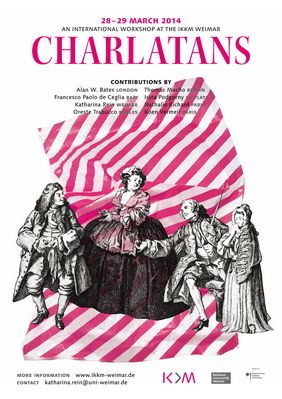Internationaler Workshop »Charlatans« am IKKM
28. & 29. März 2014, IKKM, Salon im ehem. Palais Dürckheim, Cranachstr. 47, Weimar
One Hundred Years of Solitude starts by presenting Melquíades, a traveling Gypsy, who introduces knowledge to the isolated town of Macondo by means of his inventions, through stories of his adventures and by trading in the most fabulous objects — flying carpets, magnets, daguerreotypes, ice, telescopes. But Melquíades is also the author of the story — written in Sanskrit, in a »Lacedaemonian military code« and in »the private cipher of the Emperor Augustus.« One Hundred Years of Solitude, structured by characters such as Melquíades, is regarded as the most pristine example of Latin American magic realism.
The charlatan, however, is a historical character defined on the basis of his itinerant existence. Traveling from one marketplace to another, dealing in exotic objects and remedies, organizing shows and exhibitions, performing miraculous healings by appealing to the curative power of words and liniments, charlatans have traversed Europe since medieval times.
Charlatans also crossed the boundaries between popular and learned cultures. Both celebrated and opposed by physicians, scientists and philosophers, the rich and the poor, women and men, they circulated and traded knowledge and artifacts, crossing the most diverse cultural spheres. Far from being confined to certain countries or regions, they were everywhere, repeating almost the same sales strategies, the same words, the same sequence of performances. The repetition of the same fictitious stories down the centuries and across different continents calls into question not only the very possibility of assessing the truth but also the mere existence of “memory” or experience. Charlatans were able not only to discover what local people liked but also to speak their “local language”, as well as adopting the most sophisticated technological innovations as part of their performances. They were sharp observers, on the one hand, of local situations and established habits, and on the other of what was new and could be used to attract audiences and customers. One can say that charlatans, such as the Romani that came to Macondo every year, combined very ancient products with the most innovative media. Thus, if paper and telescopes were used in the charlatan’s performances of early modern times, charlatans of the 19th century adopted opera, traveling natural history museums, and electricity.
Whereas there is a wealth of literature on the classic Italian charlatans, the survival of the character and the strategies they used over the centuries and continents are worthy of further attention. This workshop, by tackling different case studies, aims to explore the charlatans as agents of circulation of knowledge in 19th century Europe and the Americas. In this workshop, we would like to explore the tension existing between their fundamental role in the circulation of knowledge and the problems they create for the understanding of “memory” in historical perspective.
Programm:
28. März 2014
15.00 - 17.00 Greeting (Irina Podgorny) and Introduction
Oreste Trabucco (Naples): Medical Charlatanism: The Case of Leonardo Fioravanti
Koen Vermeir (Paris): Waving the Magic Wand: Charlatans and Natural Philosophers in Early Modern Europe
17.00 - 17.30 Coffee Break
17.30 - 19.30
Francesco Paolo de Ceglia (Bari): The Miracle Busters. Science Shows Held in Europe Between the 18th and 20th Centuries to Reproduce the Miracle of Saint Januarius.
Alan W. H. Bates (London): Advertising Anatomists: Public Engagement and Professional Regulation in Mid-Nineteenth Century England
19.30 - 20.00
Commentary by Nathalie Richard (Paris)
20.15: Dinner
29. März 2014
10.00 - 12.00
Thomas Macho (Berlin): Sapient Pigs and Other Animal Celebrities in Circus (Vortrag muss leider entfallen)
Daniel Gethmann (Graz): Levels of Communication: The Talking Horse Tests
12.00 - 12.30 Break
12.30 - 14.30
Katharina Rein (Weimar/Berlin): “What have I here? Are you ready?” The „Second Sight“ Illusion in the Late 19th Century
Irina Podgorny (La Plata): Charlatans, Regional Fragmentation, and the Nature of Communication in 19th-Century South America
14.30 - 15.00
Commentary by Nathalie Richard (Paris)
For further information, please visit:
http://www.ikkm-weimar.de/aktuelles/aktuelles_liste/prm/68/v__d/ni__119/index.html

